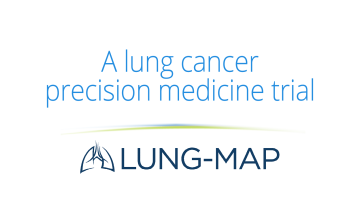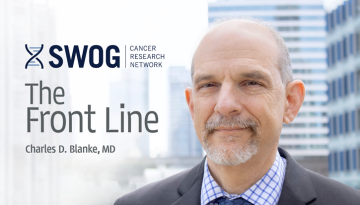SWOG Financial Toxicity Work Progresses
When you look through the agenda book for our spring meeting, you’ll see information on a training session for S1912CD, a new SWOG Cancer Research Network trial set to activate this month. It’s going to be another ground-breaker.
When you look through the agenda book for our spring meeting, you’ll see information on a training session for S1912CD, a new SWOG Cancer Research Network trial set to activate this month. It’s going to be another ground-breaker.
Dr. Veena Shankaran, long-time SWOG member and Fred Hutch researcher, is following up her landmark S1417CD – the first study of financial toxicity in our National Clinical Trials Network. In S1417CD, Shankaran wanted to better understand the problem of significant financial burdens which often come with cancer diagnosis and treatment. Many people diagnosed with cancer miss work, or lose their jobs altogether, and they struggle to pay mounting health care costs. Cancer caregivers also suffer financially, missing work to manage medical care and helping loved ones shoulder costs of cancer tests and treatments.
According to the American Cancer Society’s 2020 “The Costs of Cancer”report, Americans spent $5.6 billion out of pocket for cancer treatment in 2018. The report goes on to detail the toll – unpaid bills, depleted savings accounts, homes lost to foreclosure, even bankruptcy. People of color, low-income earners, young people, and those without a high school diploma or college degree are especially vulnerable. Meanwhile, because of our aging population and other factors, American cancer care costs are expected to rise dramatically, from $200.7 billion in 2020 to $245.6 billion in 2030.
In S1417CD, Shankaran put to the test a detailed questionnaire at three, six, nine and 12 months into their cancer treatment that asked about assets, spending, and debt, as well as stress and quality of life. Participants also agreed to have their credit reports pulled at the start and end of the trial. Results, reported at the ASCO Quality Care Symposium last year, showed that nearly three out of four participants experienced significant financial hardship during their first year of cancer treatment – despite having access to health insurance.
With a better understanding of the financial toxicity problem, Dr. Shankaran will now test a solution. In S1912CD, patients and their spouses will get help navigating the costs of cancer care. The study will determine whether financial education and counseling lessens the burden of treatment. To learn more about the trial, and the April 22 kick-off session at our spring meeting, check the agenda book on Page 8 – and register for that session!
Meanwhile, SWOG’s patient advocate chair, Rick Bangs, has also been hard at work this last year on the issue of financial barriers to cancer care.
Bangs was invited by the National Cancer Institute’s Council of Research Advocates to co-lead a working group studying the intersection of clinical trial enrollment with trial retention, financial costs, and health disparities. Last month, they presented their report, which you can read here.
The group developed six recommendations to generate data, identify solutions, and ultimately reduce the costs of cancer clinical trials, allowing more equitable trial access. The recommendations are:
- Identify the types of financial costs, financial concerns, and the extent of cost barriers to trial participation
- Develop methodology, including novel technology, to collect cost-related data for those participating in trials
- Develop methodology to understand the role of social determinants of health in trial participation in diverse populations
- Generate evidence to more fully understand the role of different types of payers and insurance plans as a barrier or facilitator to clinical trial participation for various populations
- Create and evaluate interventions aimed at reducing cost barriers to trial participation and completion, align decision-making stakeholders on operational details and specifications, and establish strong partnerships across stakeholder groups
- Examine whether COVID-19-related adjustments to trial requirements may reduce perceived and/or actual cost barriers to patient and survivor enrollment in and completion of trials
These efforts and others – including the work of SWOG biostatistician Dr. Joe Unger and a patient-advocate-led pilot to reimburse patient for trial travel costs that’s part of S1806 – are evidence of SWOG’s leadership role in understanding, and combatting, financial barriers to cancer care and the heavy financial burdens of that care. I’m proud we’re leading the way, shining light not just on the problems of financial toxicity and health disparities, but actively working to solve these problems. This work is essential to our patients.
Other Recent Stories



